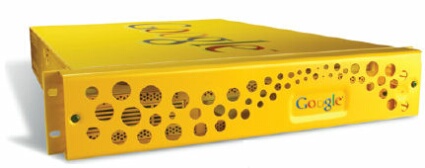New Google search tool will peer into proprietary relational databases
Mountain View (CA) - If Google had access to a rewind button for time itself - a feature which might no longer seem so far-fetched for the company to be actually working on - it could conceivably have chosen to name itself "OneBox." The brand refers to the company's philosophy of organically developing more and more services that revolve around responding to whatever the user types into that one box, so that the response is more meaningful. This morning, the concept took a major step forward, with the integration into Google's existing line of Search Appliance hardware of functionality that peers into proprietary formats of corporate databases, such as Oracle and SAS.
The Google Search Appliance, which this morning got a functionality boost with the addition of OneBox for Enterprise. (Courtesy Google)
With what Google is now calling OneBox for Enterprise, owners of the Search Appliance tool - a server component many customers still don't know the company even produces for corporate customers - will be able to peer into relational databases, retrieving information from a Google query that customers up to now may have had to retrieve using a specially programmed SQL query. Corporate statistics, financial data, customer histories, and scientific or laboratory findings could conceivably be called up from a familiar looking, clean, white page, using a query phrase like "second quarter results" or "customer satisfaction ratings."
While Google's announcement this morning - complete with quotes from partners including Oracle, Cisco Systems, and business intelligence provider Cognos - is chock full of the requisite handful of oft-repeated adjectives, such as "revolutionary," "simple," "unified," and "easy-to-use," and "better," the implications of the possible success of this product truly are deep, and worthy of analysis. An entire class of software development is currently based on the need to develop efficient queries and formal reports that represent data acquired from proprietary relational formats. If the Google Search Appliance is capable of leveraging the same level of raw horsepower that it traditionally applies to semantic pattern matching, for the task of retrieving relational data in both textual and graphical forms, then an entire category of job functions within the enterprise could rapidly become obsolete.
Who would this impact, besides the people holding those jobs presently? Obviously, the businesses making investments in the Search Appliance have an interest in cutting costs. If those reclaimed jobs aren't simply repositioned into what could become a new and burgeoning field of policy management - enforcing limits to how employees make use of this class of tool - then the Appliance could conceivably pay for itself in a very short time.
But in the applications marketplace, this also impacts Microsoft, which does not have a search appliance of its own, and doesn't appear to have plans to enter the server hardware market anytime soon. Right now, among database development professionals, the requirement for SQL Server fluency is growing at a rate faster than for Oracle. A sudden drop in the demand for SQL Server job skills could affect Microsoft today more than Oracle, which in partnering with Google, appears willing to take the hit. Furthermore, Microsoft's ambitions in Web application development through Windows Live - the pet project of new CTO Ray Ozzie - are principally centered around smart clients (Atlas / AJAX) and smarter applications servers (Windows Live servers), which are presently hosted by Microsoft. Big businesses are not as likely to embrace the idea of "offshoring," if you will, the process of querying confidential search data, to an offsite server presumably someplace on the Redmond campus. Meanwhile, Google's Search Appliance is an actual yellow box that could be hosted wherever the customer desires, including on-site, thus maintaining critical privacy boundaries.
On the other hand, Google's strength at present is as a consumer-level brand; its muscle as a provider of enterprise-level services has yet to be tested. While SAS, Oracle, and other corporate brands are willing to attach themselves to Google's promotions, perhaps the key to making this new functionality visible to its targeted market is whether these other respected companies will be willing to promote Google in turn. For that to happen, companies like Oracle would be expected not to just "take the hit," but to reap some kind of tangible benefit over time - and it isn't quite clear yet just what that benefit could be.
Get Tom's Hardware's best news and in-depth reviews, straight to your inbox.
Meanwhile, Google is actively seeking new partners, just as it has with nearly all its other projects in the past, to help develop its OneBox for Enterprise API on an open basis, to interface with data in other formats. Such partnerships have enabled Google to open up access, according to today's announcement, to Lotus Notes data - the irony of which is not lost upon Microsoft, whose CTO is Notes' creator.
Microsoft has a few options. Perhaps Google's leading competitor in the search appliance business is a company called Thunderstone, which also produces the Texis lexical database system used by many text-heavy Web publishers. The two companies are already friendly with one another. Similar functionality to Google's, but geared toward SQL Server, could be engineered for Thunderstone appliances without the need for merger or acquisition. Or, Microsoft could do what it has so often done before, usually with astonishing success: sit this market out, and wait for its competition to spectacularly fail.
